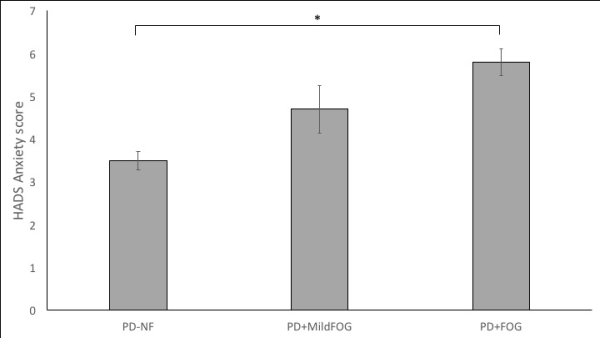Session Information
Date: Monday, June 20, 2016
Session Title: Parkinson's disease: Non-motor symptoms
Session Time: 12:30pm-2:00pm
Location: Exhibit Hall located in Hall B, Level 2
Objective: The current study evaluated (i) whether PD+FOG have greater anxiety compared to PD-NF, and (ii) whether anxiety in PD is related to executive dysfunction, in order to better understand how anxiety might be contributing to FOG. In addition, we explored whether anxiety levels differed between those PD patients with mild FOG (PD+MildFOG) compared to PD-NF.
Background: Previous research has shown that anxiety in Parkinson’s disease (PD) is associated with freezing of gait (FOG), and may even contribute to the underlying mechanism. However, limited research has investigated whether PD patients with FOG (PD+FOG) have higher anxiety levels when compared directly to non-freezing PD patients (PD-NF) and moreover, how anxiety might contribute to FOG.
Methods: Four hundred and sixty-one patients with PD (231 PD-NF, 180 PD+FOG, 50 PD+MildFOG) were assessed using the Freezing of Gait Questionnaire item 3 (FOG-Q3), Hospital Anxiety and Depression Scale (HADS), Digit Span Test, Logical Memory Retention Test and Trail Making Tests.
Results: Compared to PD-NF, PD+FOG had significantly greater anxiety (p<0.001) [figure 1]. PD+MildFOG, however, demonstrated similar levels of anxiety as the PD+FOG. In all patients, the severity of anxiety symptoms were significantly correlated to their degree of self-reported FOG on FOG-Q3 (p<0.001) and TMT B-A (p=0.039). 
Conclusions: These results confirm the key role played by anxiety in FOG and also suggest that anxiety might be a promising biomarker for FOG. Future research should consider whether treating anxiety with pharmacological and/or cognitive behavioural therapies at early stages of gait impairment in PD may alleviate troublesome FOG.
To cite this abstract in AMA style:
K.A. Ehgoetz Martens, J.M. Hall, M. Gilat, M.J. Georgiades, C.C. Walton, S.J.G. Lewis. Anxiety and freezing of gait: A new perspective for early intervention [abstract]. Mov Disord. 2016; 31 (suppl 2). https://www.mdsabstracts.org/abstract/anxiety-and-freezing-of-gait-a-new-perspective-for-early-intervention/. Accessed May 9, 2025.« Back to 2016 International Congress
MDS Abstracts - https://www.mdsabstracts.org/abstract/anxiety-and-freezing-of-gait-a-new-perspective-for-early-intervention/
